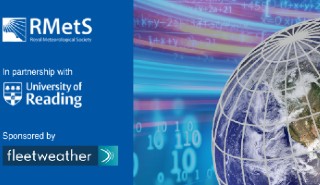Weather and climate masterclasses led by Reading scientists
18 February 2022

Free masterclasses on understanding and predicting the weather and climate will be delivered Reading scientists in March.
Three classes will be presented by meteorologists at the University, as part of the masterclass series titled ‘Advances in weather and climate forecasting’, being run in partnership with the Royal Meteorological Society (RMetS).
Reading experts will discuss the latest science behind forecasts, including techniques such as data assimilation and machine learning, atmospheric teleconnections, and advances in modelling.
The classes are free to sign up to thanks to sponsor FleetWeather. The masterclass series is intended to support professionals working in meteorology and climate science and its operational applications to remain up to date on recent thinking and developments.
Masterclasses will run weekly on Wednesday, on 16, 23 and 30 March, from 3 pm to 4.30pm (GMT). They will each consist of a presentation followed by the opportunity for questions and discussion with the speaker.
Whilst the webinars are part of a series, attendees can pick and choose which sessions they attend.
The sessions will be recorded and made available to RMetS members who have registered, with the option to email questions up to one week after the date of the recordings going live.
Visit rmets.org/events to register to attend the masterclasses, and follow the discussion using the hashtag #MetMasterclass
EVENT DATES AND TOPICS
Wednesday 16 March 2022
3 pm - 4.30 pm (GMT)
Extracting Causal Information from Climate Data
Speaker: Dr Marlene Kretschmer, University of Reading
There are large uncertainties when it comes to predicting extreme regional weather and climate events. A limited causal understanding of the physical drivers of extremes – such as connections to the North Atlantic Oscillation or Madden-Julian Oscillation - compounds the issue when interpreting climate model forecasts. Yet, to justify taking critical actions in the light of uncertainty, explanations are crucial because they provide decision-makers with a level of plausibility.
Therefore, weather and climate forecasting progress strongly depend on an improved causal understanding of the climate system by analysing the large data sets from observations and climate models. A physical knowledge of the underlying mechanisms and different statistical techniques is needed.
In this talk, Dr Kretschmer will show how recent causality research advancements can help reconcile the two. A causal approach requires explicitly including expert knowledge in the statistical analysis, allowing for quantitative conclusions. This session will illustrate some of the key concepts of this theory with concrete examples of well-known atmospheric teleconnections and will discuss the particular challenges and advantages these imply for climate science.
Wednesday 23 March 2022
3 pm - 4.30 pm (GMT)
How do we use the 'Weather' in 'Numerical Weather Prediction'?
Speaker: Professor Peter Clark, University of Reading
We have been forecasting using computer models for well over 50 years. However, while we soon became used to the idea that so-called 'NWP' (Numerical Weather Prediction) models predict the synoptic-scale meteorology, such as the position and strength of low- or high-pressure regions, they still lacked the resolution or sufficiently sophisticated representation of physical processes to forecast the 'weather' such as rain, cloud, fog without additional help from some post-processing or interpretation by meteorologists.
Vast increases in computer power have led, in part at least, to increases in model resolution and sophistication, pioneered in regional models to the extent that they now represent much of the 'weather' directly. Model horizontal grid lengths of 1-2 km are now standard, and some centres are investigating resolutions 10 times higher, such that some of the motions we would label as 'turbulence' are explicitly simulated. This has contributed to considerable improvements in forecasting, but, paradoxically, smaller scales are less predictable than larger scales, so we are faced with a real dilemma over what we can believe in models and how we extract the best information.
This talk and discussion will highlight these issues and discuss some of the work that is happening to help us make the best use of these advances.
Wednesday 30 March 2022
3 pm - 4.30 pm (BST)
Data assimilation and Crowdsourced Observations in Numerical Weather Prediction
Speaker: Professor Sarah Dance, University of Reading
Weather forecasts are obtained by combining weather observations with computational predictions using a data assimilation process. Forecast accuracy relies on accurate estimates of the uncertainty in these weather observations. Professor Dance will introduce data assimilation, the observations used in numerical weather prediction and how observation uncertainty is dealt with in the data assimilation process.
New, inexpensive crowdsourced observations are being investigated for numerical weather prediction to fill gaps in existing scientific observing networks. However, the uncertainty comparisons between crowdsourced observations and numerical model predictions are not well understood. For example, the measurements will be affected by their local environment (e.g. a temperature measurement in a sheltered street will give a different reading to one made on the top of a skyscraper). Therefore, data assimilation algorithms must take account of the discrepancy in space and time scales represented by the model and those observed in the actual process.
Examples will be given from recent research, including temperature and wind observations from air traffic control reports and temperature observations from private cars. This talk will also discuss how modern deep learning techniques could be used alongside these datasets to improve numerical weather predictions in the future.

